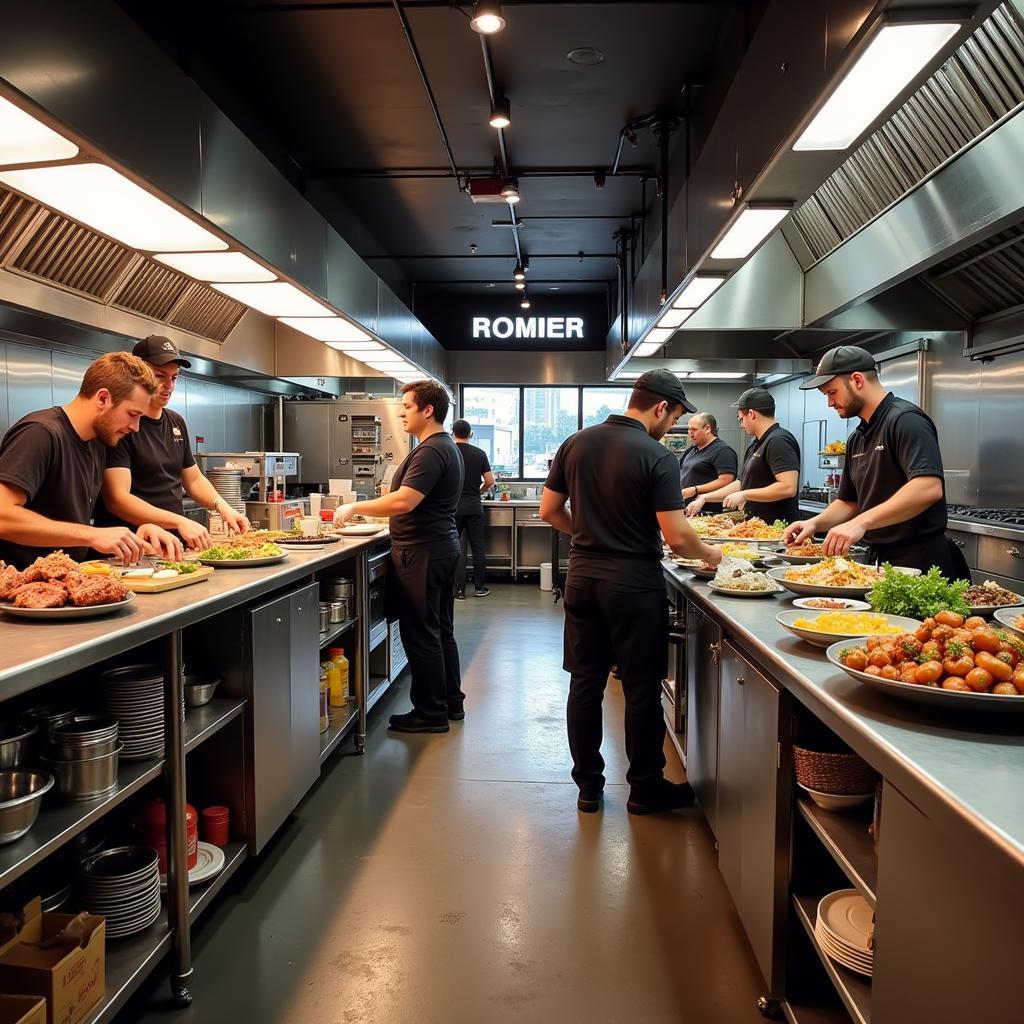Running a food truck is more than just whipping up delicious eats; it’s a business that requires careful planning and budgeting. Understanding Food Truck Commissary Costs is crucial for your success. This guide breaks down everything you need to know about these essential expenses so you can hit the road prepared.
What Exactly Are Food Truck Commissary Costs?
A commissary is a commercial kitchen space that food trucks rent to prepare food, store supplies, and handle administrative tasks. These shared spaces are essential for complying with health regulations and maintaining food safety standards. Commissary costs encompass various fees and expenses that contribute to the overall operational costs of your food truck business. Think of it as your home base, but for your culinary creations on wheels.  A busy commissary kitchen with multiple food truck vendors prepping ingredients.
A busy commissary kitchen with multiple food truck vendors prepping ingredients.
Breaking Down the Typical Food Truck Commissary Costs
Commissary fees can vary significantly based on location, amenities offered, and the size of your operation. Understanding these variables is key to accurate budgeting.
- Rental Fees: This is your basic cost for using the space, often charged monthly. Expect higher rates in prime locations or for larger areas.
- Storage Fees: Need extra space for your dry goods and ingredients? You’ll likely incur storage fees, which can be charged per square foot or as a flat rate. food truck storage near me
- Utility Fees: Water, electricity, and gas usage are often included in your commissary costs, either as a flat fee or based on your consumption.
- Waste Disposal Fees: Proper waste disposal is crucial in a food business. Commissaries usually charge for grease trap cleaning, trash removal, and other waste management services.
- Equipment Usage Fees: Some commissaries offer access to specialized equipment like ovens, grills, and fryers. These may be included in your rent or come at an additional cost.
- Administrative Fees: Some commissaries charge for administrative services like mail handling, scheduling, and access to office space.
- Maintenance Fees: Costs associated with maintaining the shared kitchen space, including cleaning and repairs, might be passed on to users.
How Much Should You Budget for Food Truck Commissary Costs?
While there’s no one-size-fits-all answer, expecting to spend anywhere from $500 to $2,000 per month is a reasonable starting point. Factors influencing this cost include the size of your operation, location, and the specific services you require. how much to rent food truck
What Factors Influence Commissary Pricing?
Understanding the factors impacting commissary costs can help you make informed decisions. Location plays a major role, with urban areas generally commanding higher prices. The range of amenities offered also significantly influences the overall cost. A commissary with state-of-the-art equipment and ample storage will naturally be more expensive than a basic kitchen space.
Tips for Minimizing Your Commissary Expenses
Smart budgeting and efficient operations are key to maximizing your food truck profits. Here are some tips to help you keep your commissary costs in check:
- Negotiate your lease: Don’t be afraid to negotiate with the commissary management to get the best possible rates.
- Share resources: Consider teaming up with other food truck owners to share storage space or purchase supplies in bulk. issa food
- Optimize your usage: Plan your prep work efficiently to minimize the time spent at the commissary and avoid unnecessary utility charges.
- Explore different commissary options: Compare prices and services offered by various commissaries in your area to find the best fit for your budget and needs.
- Maintain open communication with commissary management: Staying informed about upcoming rate changes or additional fees can help you avoid surprises and plan your budget accordingly.
Conclusion: Mastering Food Truck Commissary Costs for Success
Understanding and managing your food truck commissary costs is a cornerstone of running a profitable food truck business. By carefully evaluating your needs, exploring different options, and implementing cost-saving strategies, you can ensure your commissary expenses don’t eat into your bottom line, allowing you to focus on what matters most: serving up delicious food and building your brand. Remember, a well-planned budget is a recipe for success in the competitive food truck industry. food truck license pa cost
FAQ
-
What is a food truck commissary? A commissary is a shared commercial kitchen space used by food trucks for food preparation, storage, and administrative tasks.
-
Are commissary costs fixed? No, they vary based on location, services, and usage.
-
Can I negotiate commissary fees? Yes, negotiating your lease terms is often possible.
-
How can I reduce my commissary expenses? Sharing resources, optimizing usage, and comparing options are effective strategies.
-
Why are commissaries important for food trucks? They ensure food safety compliance and provide necessary facilities.
-
What are some common commissary fees? Rental, storage, utilities, waste disposal, and equipment usage fees are common.
-
How do I find a food truck commissary near me? Online searches and industry networking can help you locate nearby commissaries.
“Location, amenities, and your business volume all contribute to the final cost. Don’t undervalue the importance of a well-equipped and conveniently located commissary.” – Maria Sanchez, Food Truck Business Consultant
“Careful budgeting is key. Treat your commissary costs as a significant investment in your food truck’s success.” – David Lee, Restaurant Finance Specialist
commissary food service system
Need help with finding the perfect commissary for your food truck? Contact us at Phone Number: 02437655121, Email: minacones@gmail.com Or visit us at: 3PGH+8R9, ĐT70A, thôn Trung, Bắc Từ Liêm, Hà Nội, Việt Nam. We have a 24/7 customer support team.